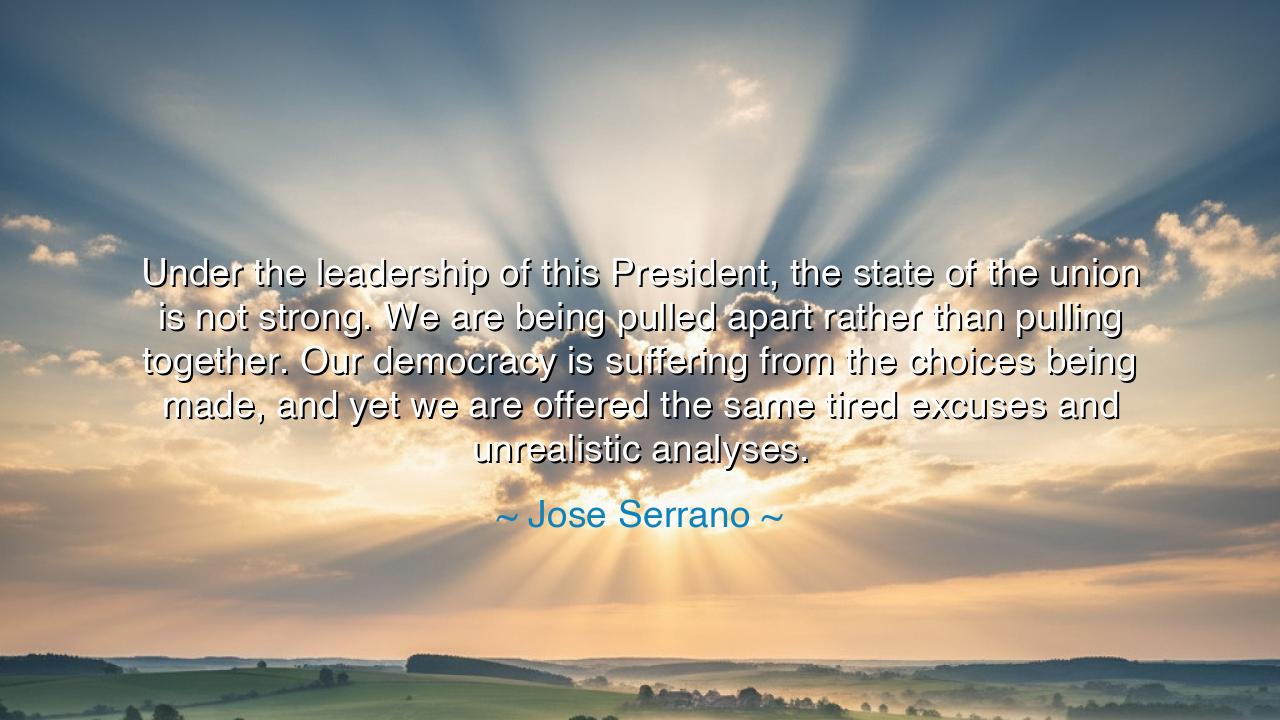
Under the leadership of this President, the state of the union is
Under the leadership of this President, the state of the union is not strong. We are being pulled apart rather than pulling together. Our democracy is suffering from the choices being made, and yet we are offered the same tired excuses and unrealistic analyses.






In the solemn and courageous words of Jose Serrano, there echoes the lament of a patriot and the warning of a seer: “Under the leadership of this President, the state of the union is not strong. We are being pulled apart rather than pulling together. Our democracy is suffering from the choices being made, and yet we are offered the same tired excuses and unrealistic analyses.” These words, though born of a moment in political strife, speak beyond the boundaries of one nation or one time. They are the cry of every age when leadership falters, when the bonds of trust that hold a people together begin to fray, and when truth itself is drowned beneath the clamor of hollow justification.
The origin of this statement lies in the halls of American governance, yet its wisdom belongs to the entire human story. Serrano, a representative of the people, uttered these words during a time of political division and disappointment, when promises of unity had turned to echoes of discord. His words were not merely an indictment of policy, but a call to conscience — a reminder that the health of a nation is not measured by wealth or military power, but by the strength of its democracy, the harmony of its citizens, and the integrity of its leaders. When leadership loses moral clarity, the people drift like ships without a compass, and even the mightiest nation becomes fragile.
To say that “the state of the union is not strong” is to pierce through illusion — to look beyond rhetoric and face reality. The ancients would have called this the virtue of parrhesia — the courage to speak truth to power. It is the voice of the prophet in the court of kings, the scholar before emperors, the citizen standing firm against deceit. Serrano’s words remind us that a leader’s duty is not to divide and excuse, but to bind and restore. For unity is not achieved through slogans, but through justice; and democracy is not preserved by pride, but by humility before the truth.
History has seen this struggle again and again. Consider the story of Cicero, the Roman statesman who warned his people that their republic was rotting from within — not from external enemies, but from corruption, ambition, and the decay of public virtue. His warnings went unheeded; Rome, blinded by arrogance, fell into tyranny. Serrano’s words carry the same ancient warning: that when leaders seek to preserve themselves rather than the people, the light of freedom flickers. And when citizens grow weary of discernment, trading truth for comfort, they become accomplices in their own undoing.
When Serrano speaks of being “pulled apart rather than pulling together,” he mourns the loss of common purpose — that sacred thread which binds individuals into a people. The strength of any democracy lies not in uniformity, but in the harmony of difference — in the ability of diverse hearts to labor for a shared good. Yet when fear replaces faith, and deceit replaces dialogue, society unravels. The wise know that nations do not collapse in a single day; they erode slowly, one lie, one compromise, one silence at a time.
His phrase “the same tired excuses and unrealistic analyses” cuts even deeper. It is a condemnation not only of leadership but of complacency — the human tendency to soothe the conscience with illusion. For how often have societies chosen to ignore decay, painting over injustice with false hope? The ancients knew that self-deception is the first symptom of decline. When excuses replace accountability, and analysis becomes propaganda, truth loses its power to heal. Thus, Serrano’s warning becomes a plea: awaken, before habit hardens into fate.
The lesson in these words is not despair, but renewal. For though democracy may suffer, it is not doomed. Every generation must rediscover the meaning of leadership — not as authority, but as service; not as domination, but as stewardship. When the people demand integrity and hold power to account, the republic revives. The true patriot is not the one who flatters the state, but the one who calls it back to its highest ideals. Serrano’s challenge, then, is not only for leaders but for all citizens: to pull together, to seek truth above comfort, and to act not as partisans, but as guardians of a shared destiny.
So let these words be carried like a torch across the ages: when the state of the union — or of any people — grows weak, the remedy lies not in excuses, but in courage. Stand for honesty when deception is fashionable; build bridges where others raise walls; and remember always that democracy, like the human soul, survives only through vigilance, virtue, and unity. For a nation divided by pride cannot endure, but a people united in truth can rise from any darkness — and make the world strong once more.






AAdministratorAdministrator
Welcome, honored guests. Please leave a comment, we will respond soon